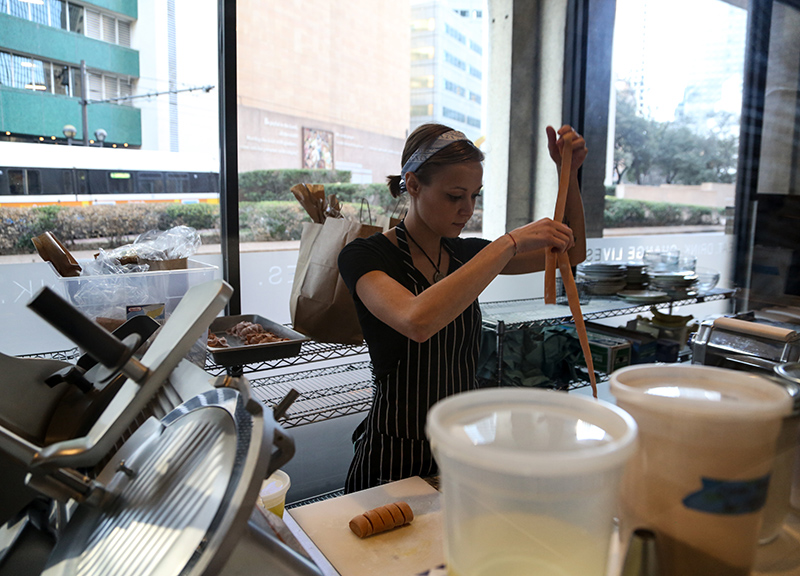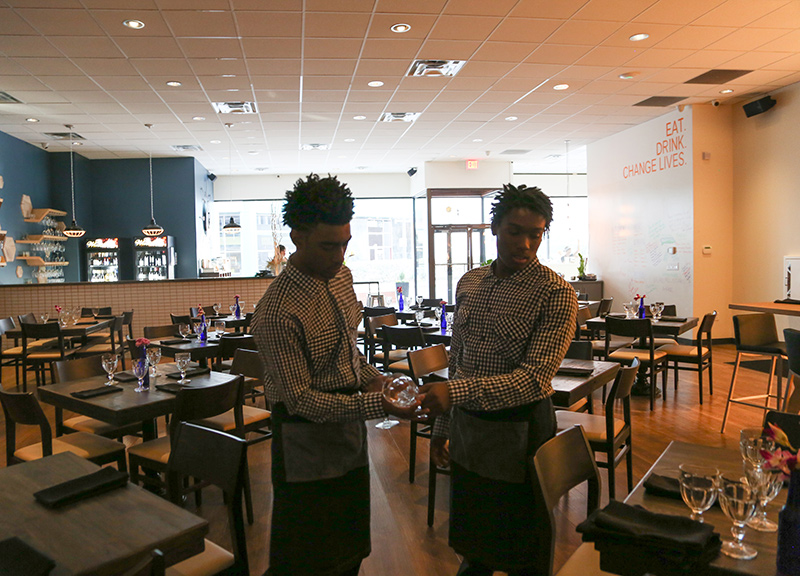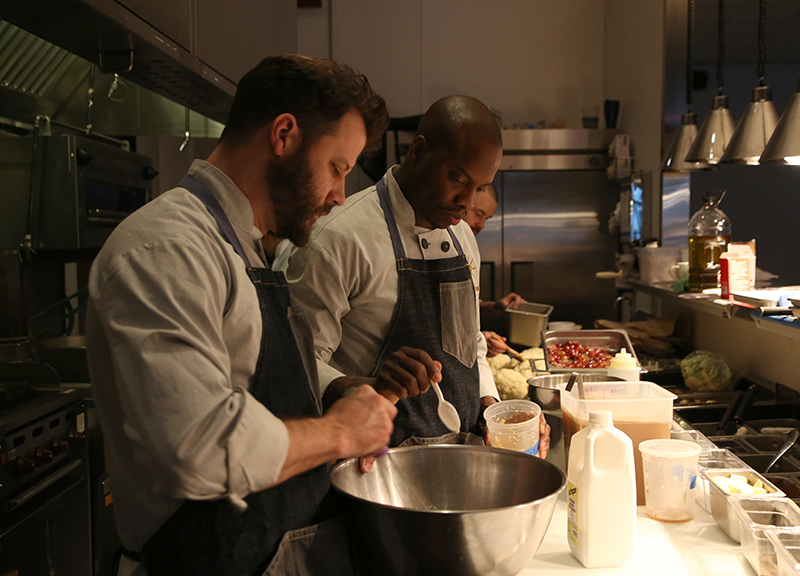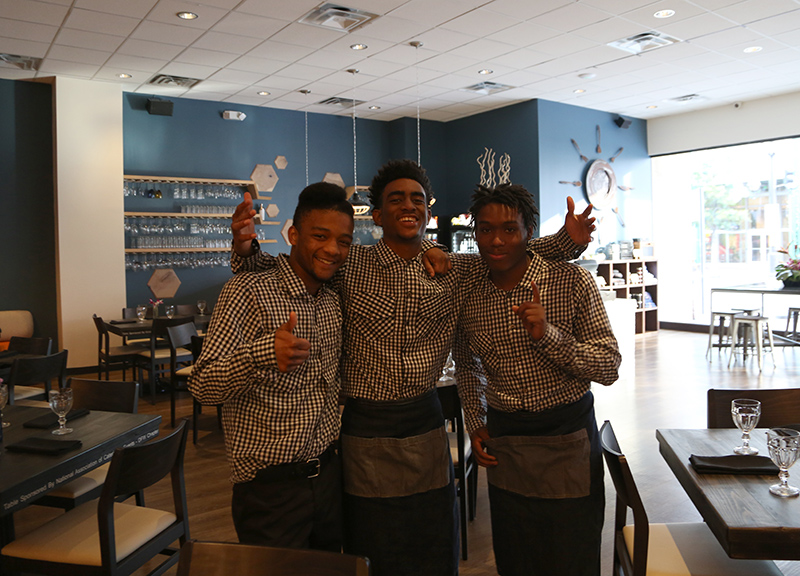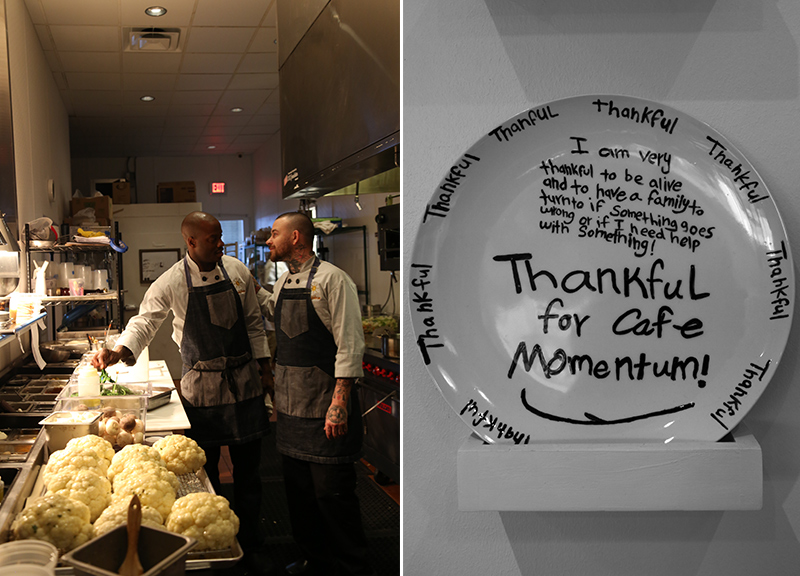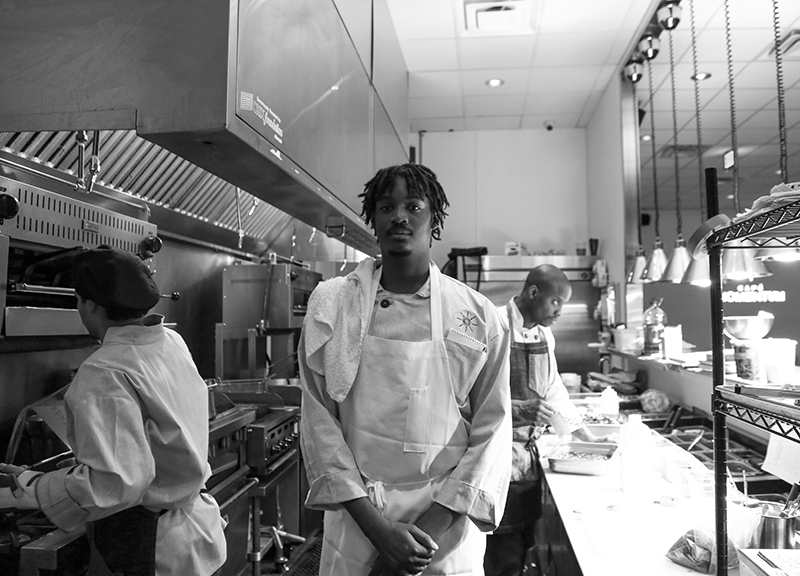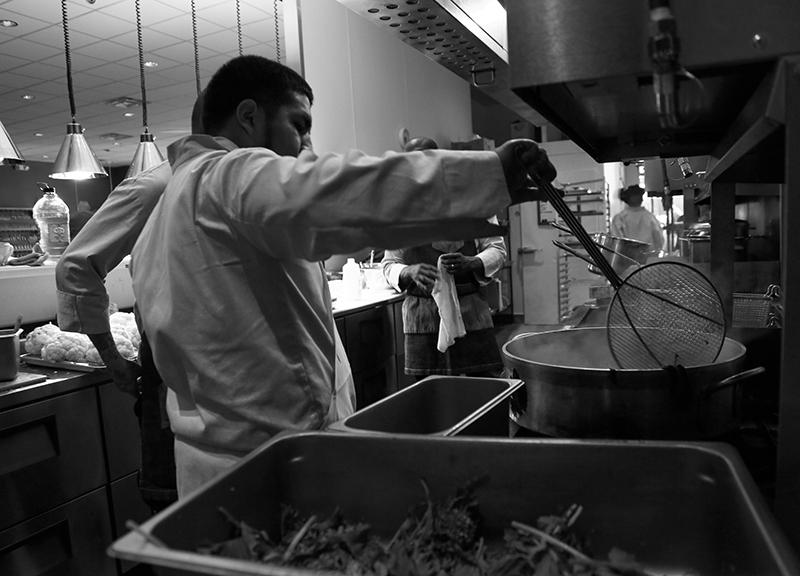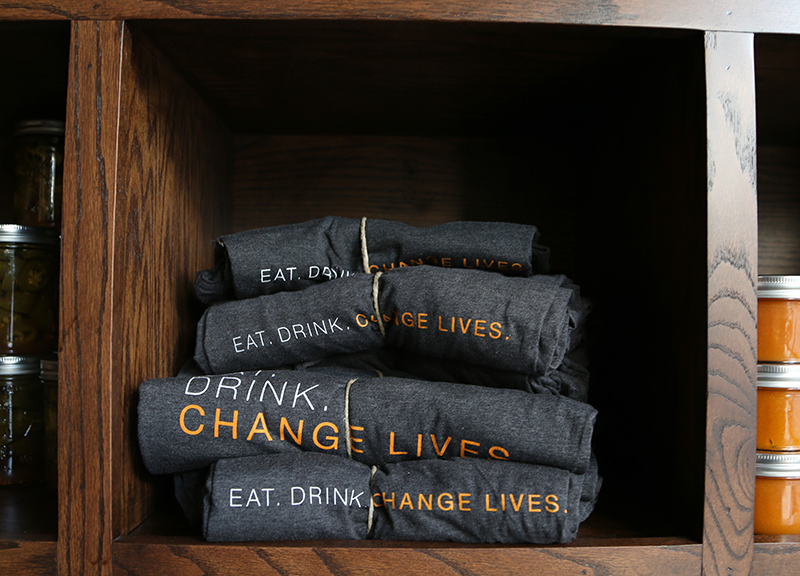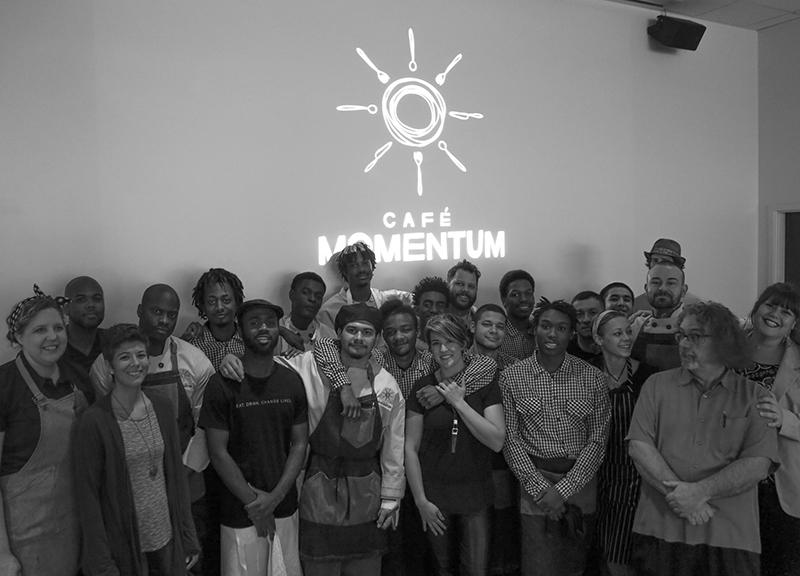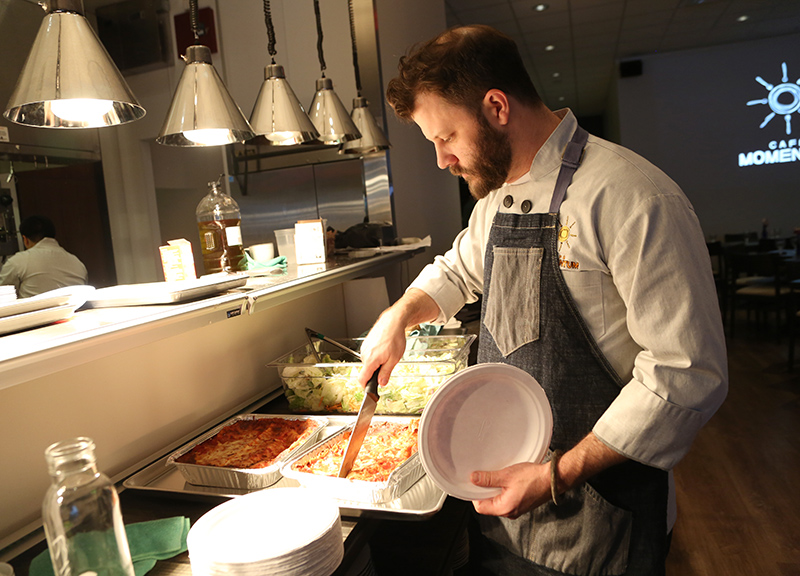In Downtown Dallas, Chad Houser And The Cafe Momentum Team Are Changing The Lives Of At-Risk Area Youth, One Dinner Service At A Time.
When he was 17 years old, Adolf Martin found himself at a crossroads.
With each of his parents absent for most of his life, the lanky, New Orleans native was raised primarily by his grandmother, who was not always able to deal with the wiles of an adolescent boy. In turn, like many before him, Martin fell prey to the streets. By the time he was 16, he already boasted a criminal record that had landed him in the Dallas County Youth Village, a non-secure residential placement program for non-violent males aged 13 through 17.
There, he was faced with the choice of maintaining the status quo — and likely a life of inescapable recidivism — or completing a program offered by Youth Village where he and his fellow youths were evaluated and awarded points based on their improved behavior and social skills. Along this track, time served (the program takes six months to complete) and an accumulation of a certain amount of points could earn these juvenile offenders overnight visits to their homes.
It was within this program where Martin first heard about Café Momentum, a Dallas restaurant unlike any other. And it was then, as a 17-year-old, that he decided that working there would be his path back to the straight and narrow.
“I got into the program [because] I violated probation for, like, the second or third time,” says Martin. “So Cafe Momentum was like an incentive. If you did points and were going home, then you got to go work with [executive director] Chad [Houser] and the organization, getting that experience, and actually earning a paycheck. I did every single [point] while I was in Youth Village. So it was something I could see myself doing and [where I could] meet some wonderful people.”
Well, that’s mostly true.
A large window opens up the kitchen to the dining room and allows patrons to see the hard-working hands preparing their meals — the ones that make this space wholly unique. On the other side of that glass, any number of the 37 non-violent teenage offenders working alongside Houser and his staff can be seen working, giving diners their first big glimpse at what makes Café Momentum a one-of-a-kind establishment.
It’s a noble cause behind this venture, to be sure: At Cafe Momentum, under the supervision of Houser and a handful of other professional restaurant workers, area at-risk youths are put to work in a traditional environment and given an opportunity to see how different the world can be from the narrow view they’ve previously seen.
Still, walking into the Cafe Momentum space — formerly occupied by Tovi Mediterranean Cafe — you’d never really guess its ultimate mission. It’s surprisingly normal-looking. There’s an open-concept layout designed for maximum interaction between the interns, staff and patrons. Through the large storefront windows are a prep station (where the excess from items not used in meals will be repurposed into new goods) and a retail nook. The dining room can also serve as accommodations for a conference space, thanks to projection and surround-sound installations. The kitchen is in closer proximity to the front of the house than one might expect, but without it being pointed out, most diners will likely miss this detail.
But that’s an important detail: Behind the kitchen, the back of the house is set up as classroom space for Momentum 101 — the program’s educational component that offers a range of classes from financial and family planning to anger management — as well as lockers and a closet that now serves as the in-house laundry facility.
Houser says that renovating this space for these needs was something of a laborious process, one that utilized the help of the entire staff. But that too worked toward this program’s end. Each person’s participation lent a sense of pride over the new domain, one that transcends the typical feelings associated with clocking into one’s place of employment. Rather, this process was aimed at establishing a sense of belonging, a sense of home.
“Family” is a term that’s heavily emphasized within the Cafe Momentum organization — and for good reason. Most of the program’s interns have a broken understanding of that concept.
Growing up, his time was split between his home in Allen and visiting his mother’s side of the family in Pleasant Grove. The differences between these two areas quickly became clear to him.
“I just saw two different worlds — and I felt comfortable in both,” Houser says. “But I knew that both were kind of exclusive at a young age.”
It was five years ago, while he served on the board of the Dallas Farmers Market Friends, that he formally formed a bridge between his own experiences and the at-risk youth population of the greater region. It was during an ice cream contest he helped run for students from El Centro and the Art Institute of Dallas that his fellow board member Jerry Silhan, the executive director of Youth Village Resources, came up with the idea of inviting eight kids from the organization’s pre-release programs to help with the event. The board agreed, placing Houser with the task of teaching these youths to make ice cream.
“I definitely walked in there with a stereotype in my mind, even with all the barriers that I had broken down between Pleasant Grove and Allen,” he says now. “I still had a stereotype as to what a kid in jail looks like and acts like, and I was just dead wrong. Every one of them looked me in the eye. Every one of them called me sir. Every one of them was so eager and enthusiastic to make ice cream, and do something that they could be proud of.”
Sure enough, it was one of those kids from Youth Village Resources who won the contest. And the glee he expressed to Houser in that victorious moment would stand to become one of the biggest catalysts in pushing Houser toward his endeavors with Cafe Momentum.
“The whole drive home, I remember thinking to myself, ‘You have every right to pat yourself on the back, and think you did a good job, you inspired that kid today,'” Houser says. “However, if I could do that in one day — or two, as it were — what could I do if I really started working with them long term?”
After the event, Houser continued to work with Silhan on a program geared towards working with and benefitting these at-risk kids. The goal was to create a post-release program to assist juvenile offenders upon their release from detention.
“We just kept marinating on the idea of how that looks or what to do till we decided eventually just to open a restaurant and have an internship where they could work all the way through the restaurant,” Houser says.
From that point, it was a matter of figuring out the best way to help the kids while simultaneously trying to open said restaurant. As if the intricacies of the restaurant business didn’t present enough challenges on its own, there was also the task of how to effectively help a population whose reputations not only precede them, but whose members represent one of the most under-served populations in the country.
“Initially, people thought it was crazy,” Houser says. “[They gave] every reason in the world why it won’t work — everything from what’s the failure rate of restaurants to how do you know that these kids will show up and all the way to — what’s funny to me now — the menu. It’s almost like they’re expecting me to say that it’s dumbed down, [but] I got into the industry to cook the best food that I possibly can.”
“You begin to then start to actually work with guys more and more, start to realize their stories, and start to realize that it’s so much more than just a job,” Houser says. “They need a lot.”
It was for this reason that Houser has since pushed for what he says is a holistic, wraparound approach to the program, one that considers all of the factors relative to the program’s interns and their situations. In order to better understand these issues and better combat them, a qualitative study was done by Dr. Sheri Kunovich and students in the Southern Methodist University’s sociology department on recidivism and employment among this particular population. The results were startling: Literally no help was being given to these young men — to the point that there was no data on the population other than recidivism.
“We know that they go back,” Houser says, “but nobody is really working to keep them out.”
As a result, Cafe Momentum has built more progressive levels into its model. Workers who start as Youth Village interns aren’t just given the chance to learn; they’re also given a light at the end of the tunnel, with the restaurant offering these young offenders the chance to earn gainful employment here upon the completion of the program.
Better yet, all signs show that the program’s efforts are paying off. At Cafe Momentum, recidivism rates are a mere 11 percent, a figure that’s less than a third of state-wide figures.
Another key player in establishing a line of communication among the youths involved is Cafe Mometum’s director of case managements and programs, Darian Thomas. Although he’s only been with the organization for less than a year and is thus a relatively new member to the “family,” his friendship with Houser dates back to the program’s earliest days.
“I’ve known Chad for about three years,” Thomas says. “We both have similar interests for laying your heart down and trying to change someone else’s life by doing that.”
While Thomas’ background is in business and consulting, he has experience working with under-served urban populations both overseas and throughout the U.S. His role within the Cafe Momentum program focuses on the social work side of things, dealing with how to help some of the immediate issues a lot of the interns face.
“A lot of my responsibility is really being present with the guys,” Thomas says. “Everyone that comes to us has been touched by unemployment, abuse, violence, foreclosure, need for clothes, need for food, need for shelter. They’ve been touched by one or almost all of them. We seek to first stabilize the situation for them — whatever that means, whether it’s buying them clothes, going to court with them [or] getting them a doctor’s appointment, whatever it is. And then, it’s just defining a level of care to help them change their lives.”
This process can take up to three or four months, depending on the individual, although the time isn’t as relevant as establishing a sense of trust among the guys. Once Thomas understands where each individual is in life, it’s then his job to come up with a program and class schedule to help address these issues. Thomas’ presence also offers another advantage: As an African-American male, he’s able to relate to the interns, half of whom are also black, in ways that Houser may not be able to.
“It would be misleading to say color doesn’t matter,” Thomas says. “With respect to case management, for this particular role, you really gotta have a heart, and anybody can have that. But with respect to communicating, and maybe understanding just their experience, I grew up in the Fair Park area of Dallas. I don’t understand everything that they’ve dealt with, but I do understand what it feels like to walk down the street black, and what it feels like, and how to motivate them or get a point across in a way that someone else might do differently.”
Conversations about race are a regular part of the organization’s day-to-day, whether it be through the use of the N-word — it’s not allowed, ever — or the implications of being stopped by law enforcement.
“We’re very, very open and honest about race in our organization,” says Houser. “We have to be.”
It’s a reflection of the organization’s notions of family and community: No subject is taboo among any of the members of Cafe Momentum’s community.
“Every single member of our staff passionately loves these boys and has zero judgment,” says Houser. “One of the things that we honestly talk to them about a lot, especially from the very beginning, is that you can tell me anything, I don’t care. I don’t care what you did. I don’t care what you’re doing. I wanna talk about the future.”
This open line of communication brings a sense of accountability, Houser says. And Cafe Momentum definitely keeps its members accountable for their actions: Martin was recently placed on temporary suspension from the restaurant for an unspecified infraction of the rules.
As with any family, discipline is an unavoidable part of setting a higher standard for Cafe Momentum’s members, Houser says. It’s a matter, he explains, of showing the interns that they can do better than they have in the past.
“He knows he’s stuck with me,” Houser says about his relationship with Martin and his recent suspension. “For better or for worse, he will take his last breath in life being stuck with me.”
“As we continue to push further into the internship, one of the things we want all of these guys to explore is what they really want to do,” Houser says. “That’s where the second half of the internship comes in. They start to look at career exploration; they start to look at what are their interests, what do they wanna do. And the beauty of that is, we have a dining room full of hundreds of people, every single night, so it creates this opportunity to now, when you’re waiting tables, ask your guests what they do for a living. If it’s interesting to you, network!”
That’s the altruistic end-goal, of course. But, as Thomas notes, simply watching these young men taking part on this journey and trying to change their lives is just as important.
“These are awesome, awesome guys,” Thomas says. “They’re worth getting to know. They’re smart. They’re intelligent. They’re the leaders of tomorrow. This is the next generation.”

